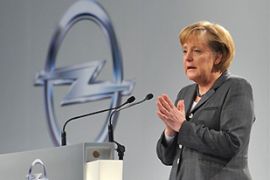US welcomes GM-Opel deal
US said there is no financial commitment by its government under the Opel agreement.

Germany approved a plan for the auto parts maker Magna to move ahead with a rescue of General Motor’s Opel unit on Saturday morning.
“Because of the special [GM/Opel] structures, the talks were a real test of transatlantic relations,” Merkel said.
Weekend agreement
The German government will provide around $6.4 billion in loan guarantees as well as $2.1 billion in temporary loans to keep Opel afloat.
| In video | ||
|
|
Under the agreement, Magna will take a 20 per cent stake in Opel and the Russian-owned Sberbank will take 35 per cent, giving their consortium a majority.
GM will retain a 35 per cent holding, while the remaining 10 percent will go to Opel employees.
The consortium plans to work together with Russian car maker Gaz to produce more than a million vehicles in Russia and Eastern Europe.
As part of the deal, all four factories in Germany will remain in operation, although Magna has said previously it will need to shed about 2,500 jobs.
Brighter future
“Opel has been given prospects for the future,” Merkel said after overnight talks between the two companies and the German government.
“Now the work for Opel and for Magna … really begins.”
| GM’s debt |
|
$27bn in unsecured debt |
Merkel said hiving off Opel from GM was a difficult task, but added she was confident the new European-wide company based in Germany would be a boost for Europe.
“It’s about creating a European company under the umbrella of Adam Opel,” Merkel said.
“We’ve got an investor with Magna and there will be no state participation even though the federal and state governments will assist with loan guarantees.
“It was a difficult task and there was much more involved than simply weighing the possible risks,” she said.
Merkel praised Karl-Theodor zu Guttenberg, the economy minister, for raising critical questions about the deal even though he expressed his opposition to the very end.
She said she disagreed with his assessment on the risks.
“It’s the job and right of the economy minister to put his finger in the wounds,” Merkel said.
“He did an excellent job preparing the way for solving the problem and supports the end result.”

